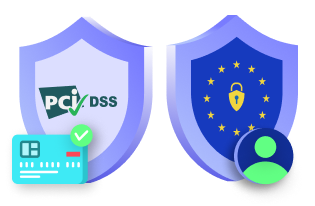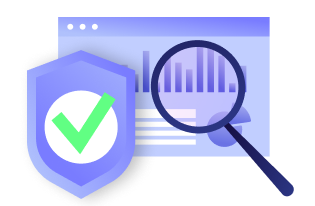Do you know how to keep your data processing privacy compliant? If there’s one thing that’s on everyone’s mind these days, it’s big data. Data has become a gold mine for businesses to gather insights that help them innovate and grow. Unfortunately, as data privacy regulations become more stringent, companies are scrambling to figure out how to stay compliant. Things like General Data Protection Regulation (GDPR) can be complex, and compliance can be tedious without the help of specific tools. The good news is Customer Relationship Management (CRM) software can help—only if configured correctly. Here’s what you need to know about how your CRM can help with GDPR compliance.
Before that, are you gearing up to launch your website? Here’s a five-part website pre-launch checklist to avoid the mistakes that can sink your launch.
Why does GDPR compliance matter?
Data privacy regulations govern how organizations collect, store and use customer data. They are designed to protect consumers by giving them control over their information and opt-out of marketing communications if needed. The European Union’s (EU) GDPR is the world’s most comprehensive data privacy regulation. It applies to any organization that processes or stores personal data related to EU citizens regardless of where they are based or where their servers are located.
GDPR compliance is essential to your business for many reasons. They help to ensure that customers can trust that their data is being used responsibly. And when customers feel safe, they’re more likely to buy from you—or recommend your brand to others. The goal is to ensure that organizations have sufficient processes to protect customer data from cyberattacks and other security breaches.
If you’re not compliant, it could cost you dearly in fines and lost revenue. Dealing with investigations and lawsuits brought on by customers who feel that their data has been misused will be much more expensive. Thus, GDPR compliance is essential for any business that handles customer data, and it’s never too early to start preparing.
How can CRM help you with GDPR compliance?
Let’s look at how CRM tools can help you with GDPR compliance:
Provides secure database
Data security is a top concern for customers and regulators. With the best CRM tools, you can set up rules that only allow certain users access to data. This is especially important when it comes to sensitive customer data, such as financial information. You can also set up security measures that ensure that only authorized people and devices have access to your CRM system.
Supports data protection
Data protection is a top priority for most businesses, and it’s no different for software like HubSpot CRM. Data protection features are built-in for most CRM software, although you can add security measures if you need them. These include encryption, two-factor authentication, and password management tools.
In addition to protecting sensitive data, many CRM systems allow you to maintain records of all customer interactions. This makes it easier to identify which customers have been affected by a breach and how they were affected.
Enables data governance
Data governance is the process of managing and controlling data. It includes defining business rules and policies, monitoring and auditing data access, as well as protecting sensitive data. A CRM system can help you manage customer information by providing you with a centralized repository for all customer records. This means all customer interactions are stored in one place where they’re easy to find and reference when needed.
Manages customer consent
To comply with GDPR, you’ll have to get consent from your customers for any marketing activity. A CRM system can help you manage consent by providing a centralized location. It is where customers can give and revoke their consent to receive marketing communications.
Offers comprehensive auditing and reporting capabilities
The GDPR requires companies to prove that they’re complying with the law. A great CRM will give you the tools needed to audit your customer data. This is to ensure that it’s compliant and hasn’t been used for purposes other than those approved by customers. It should also give you a way to track any data transfers and make sure they fall within compliance requirements.
What are CRM best practices for protecting customer data privacy?
You must configure your CRM to ensure they protect customer data and hence, helps in GDPR compliance.
Only collect the necessary data
When you’re building or configuring your CRM, be sure that it only collects the data it needs. Don’t collect data that could be used to identify a customer or make decisions about them unless they give you explicit permission.
Use encryption
The best way to protect your customer data is to use encryption. This makes it harder for unauthorized users to access the information stored in your CRM. It can also help prevent attacks that seek out unsecured data.
Have role-based permissions
Make sure you have role-based permissions set up so that only the customers who need access to customer data have it. If you give everyone in your company access to the same information, it can become very easy for someone with malicious intent to gain access and steal customer data.
Train employees on data privacy
It’s important to train your employees on data privacy and security. You can help them understand the importance of customer data in improving customer service experience or increasing sales. You can also explain how it can be dangerous if it falls into the wrong hands. Many businesses offer training on data privacy as part of their onboarding process, so make sure you have this resource.
Conduct regular audits
It’s important to conduct regular audits of your company’s data, including customer data. You can do this by conducting an internal audit or hiring a third party to perform the audit for you. Also consider regular checks on how your employees handle customer data, as well as how it is stored and transmitted.
What should you do if you experience a data breach?
Change all passwords
If you experience a data breach, it is necessary to change all passwords immediately. Additionally, ensure that any other company with access to the breached data has implemented similar procedures.
Contact authorities
It’s also important to contact law enforcement and data protection authority as soon as possible to ensure that the incident is properly investigated and that you are protected from legal action or fines.
Contact customer base
Contacting your customer base to let them know about a data breach is crucial. Explain to them what happened and how customers can protect themselves. Also, consider providing them with ID theft protection services.
Review security procedures to prevent future attacks
After you’ve begun the process of contacting law enforcement and your customers, it’s time to review your security procedures. Use this opportunity to identify any weak spots in your system that could allow another cyber attack to take place. Then, make any necessary changes so that your company is better protected from future attacks.
Read more about what you can do after your business suffers a data breach.
Supercharge your GDPR compliance with CRM
By now you have a good idea of the different CRM features that can help you stay compliant with GDPR. The key is to make personalized, customer-centered communications a priority, especially when it comes to public relations and marketing efforts. Doing this, along with meticulously maintaining records of how you handle customer data, will go a long way as you navigate the increasingly complex terrain of enterprise-wide data privacy.
Frequently asked questions
Is CRM GDPR compliant?
CRM is compliant with GDPR because it can:
- collect and process data about individuals in accordance with GDPR requirements.
- notify subjects of the data collected about them, including why it is being collected and where it will be stored (Articles 12 and 13).
- provide subjects with access to their personal information and allow them to correct or delete any incorrect data (Articles 15 and 16).
What is GDPR in CRM?
CRM is one of the most important parts of any business, so it’s important to know how GDPR impacts CRMs. Here are some key points:
- Prioritize consent management over other compliance requirements.
- Review the existing opt-in process and ensure it complies with GDPR regulations.
- Keep track of changes made to your customer’s data to ensure nothing happens without their explicit consent.
Disclaimer: This article is for general informational purposes only and should not be taken as legal or professional advice. The views and opinions expressed in this article are solely those of the author and do not necessarily reflect the views of our organization. We do not endorse any products or services mentioned in the article.







